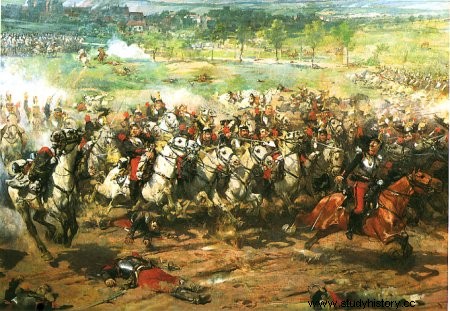
Reichshoffen Cuirassiers
Despite the crushing defeat, the French fighter did not deserve it. There were many acts of heroism. Among them, the cuirassier charges at Reichshoffen remained famous. They are part of the gesture of the French army. It was August 5, 1870, during the battle of Woerth:the center of Mac-Mahon's corps was about to be smashed. His right wing, Lartigue division, is about to be enveloped. There is no more room but for the sacrifice.
General de Lartigue seeks everywhere what force will delay the envelopment. He remembers that Marshal de Mac-Mahon placed the heavy cavalry brigade Michel at his disposal. He sent Colonel d'Andigné to General of Division Duhesme, commanding the cavalry of the first corps, and asked him for one of his cuirassier regiments. General Duhesme was seriously ill and bedridden. The plan terrified him, and, having made a sign to Colonel d'Andigné to approach:
 In the name of heaven, tell General de Lartigue that he is going to do something crazy and have my cuirassiers.
In the name of heaven, tell General de Lartigue that he is going to do something crazy and have my cuirassiers.
 General, replied the officer, there is no other way to save the wreckage of the division; and then, he added, hesitating a little, can the cavalry, without dishonor, remain an impassive witness to such a disaster?
General, replied the officer, there is no other way to save the wreckage of the division; and then, he added, hesitating a little, can the cavalry, without dishonor, remain an impassive witness to such a disaster?
At these words, General Duhesme, understanding all the horror of things, resisted no longer. In a voice moved to tears, he repeated these single words:
 My poor cuirassiers, my poor cuirassiers!
My poor cuirassiers, my poor cuirassiers!
And silently he pressed in his feverish hand the hand of Colonel d'Andigné.
Only one regiment had been requested. The two regiments of the brigade prepared for battle. They were the 8th and 9th Cuirassiers. Two squadrons of the 6th Lancers were also available. One of the captains, addressing his men, said to them, drawing his sword:
 We will not leave our comrades the cuirassiers alone.
We will not leave our comrades the cuirassiers alone.
And with these words he captured all his troops. This cavalry comprised a total of nine squadrons. It lined up in two lines in the valley formed by the Eberbach:in the lead the 8th cuirassiers, then the 9th and the lancers. General de Lartigue indicated as the objective of the charge the corps of General de Schkopp which was beginning to debouch from Morsbronn. Although the day's events made a cavalry intervention likely, there had been
Since the charge of the Light Brigade at Balaklava, Crimea, it has been demonstrated that infantry fire can break up a cavalry assault. A fortiori when, as in Reichshoffen, the cavalry must charge in a terrain bristling with obstacles or in the streets of a village.
omitted to reconnoitre the terrain, so that everything would be lacking, except for heroism. This ground itself was very unfavorable, because it was planted with trees with very low branches, cut with ditches, strewn with stumps cut at ground level.
The 8th cuirassiers formed in the shelter of the ravine; as soon as he climbed the slopes of the Eberbach, he was riddled with infantry fire, some hidden in the vineyards or orchards, others in the hop fields. Despite the bullets, the charge continues and, like a torrent, falls on Moiseront.
Upon entering, the regiment split up. While some fractions throw themselves right and left on the infantry, most rush into the long and narrow street of the village. Already the houses are occupied, and from the windows or the roofs the assailants are shot at close range. At the end of the street, a barricade has been improvised. Stopped in their course, the unfortunate riders turn back; they make their way through the fallen horses and over the bodies of their wounded comrades. At all the windows the guns are reloading, and the bullets, says an eyewitness, resound on the breastplates like hail on the panes in a storm.
Those who manage to escape reform, try to charge again. But the horsemen fall under the projectiles, the horses stumble in the ditches or become entangled in the trellises which connect the hop fields. Suddenly they come up against a detachment of Prussian hussars who fire their weapons, but, intimidated by these proud remnants, do not dare to approach the brave troops, even decimated. However, the cuirassiers of the 9th regiment, with the lancers, followed their comrades of the 8th. The same heroism with such a fate:they too, sink into the rue de Morsbronn, whirl around the village, cannot get out and almost all remain in the hands of the enemy. The losses in killed, wounded, prisoners, missing were, for the nine squadrons, nearly eight hundred men. Thirty-seven officers were killed or wounded.
A quarter of an hour later, one saw, across the plain or on the slopes of the hills, some groups of cuirassiers or lancers, lost, as if by chance, at the extreme limits of the battlefield, and who were looking for, even at the cost of long detours, to regain our lines. They were the remains of those whom a tradition, lasting as much as France itself, will honor under the name of cuirassiers of Reichshoffen or under the more exact name of cuirassiers of Morsbronn
P. de L A CORCE
